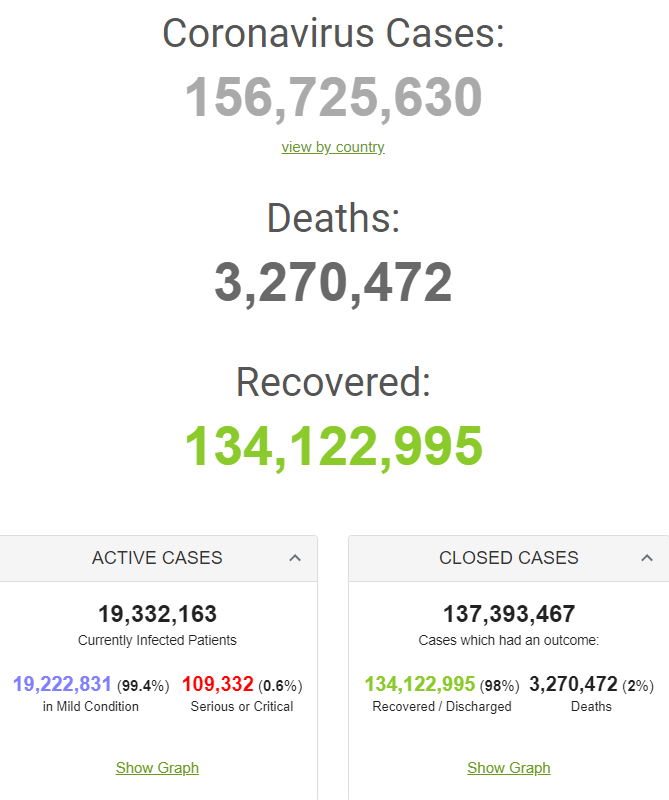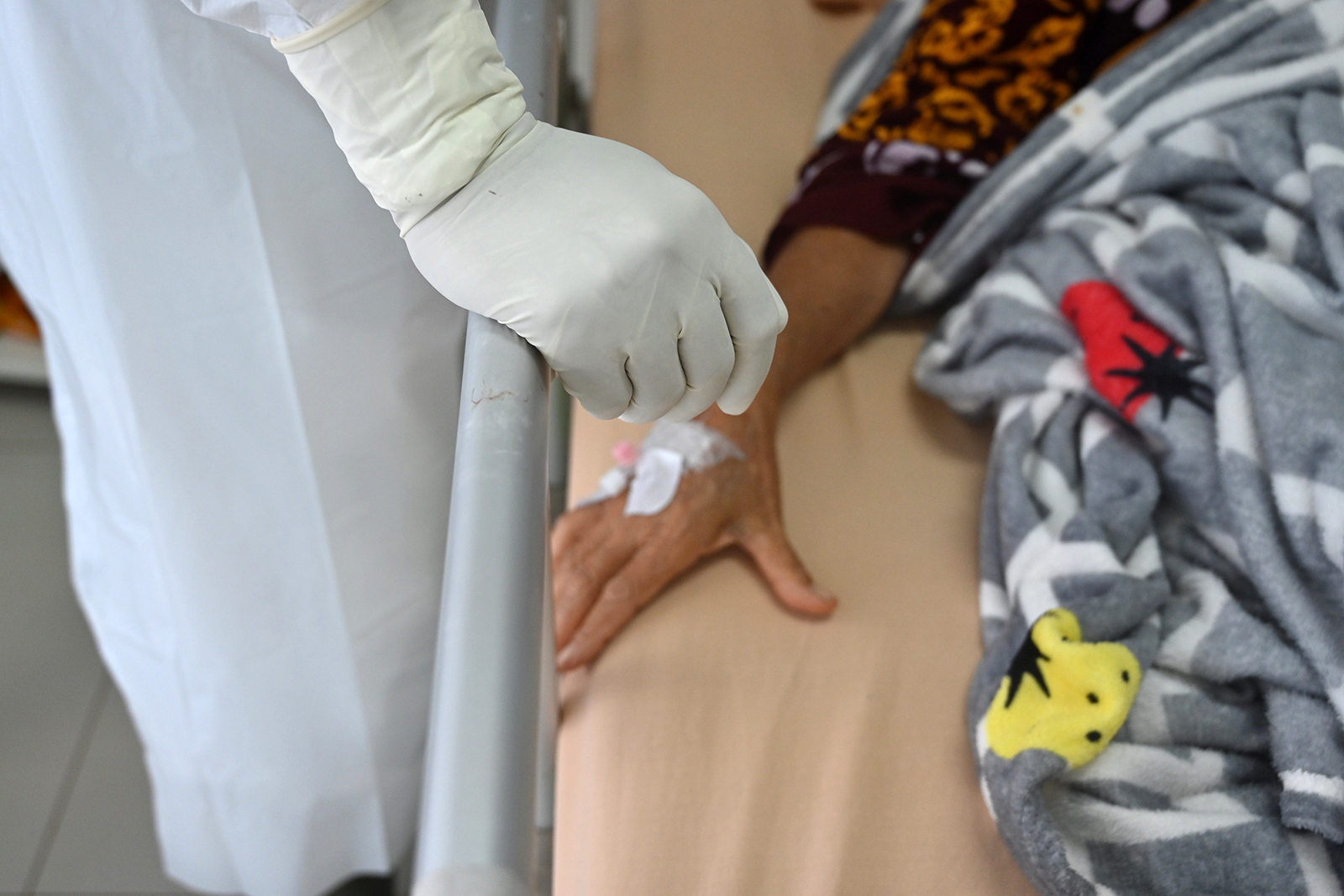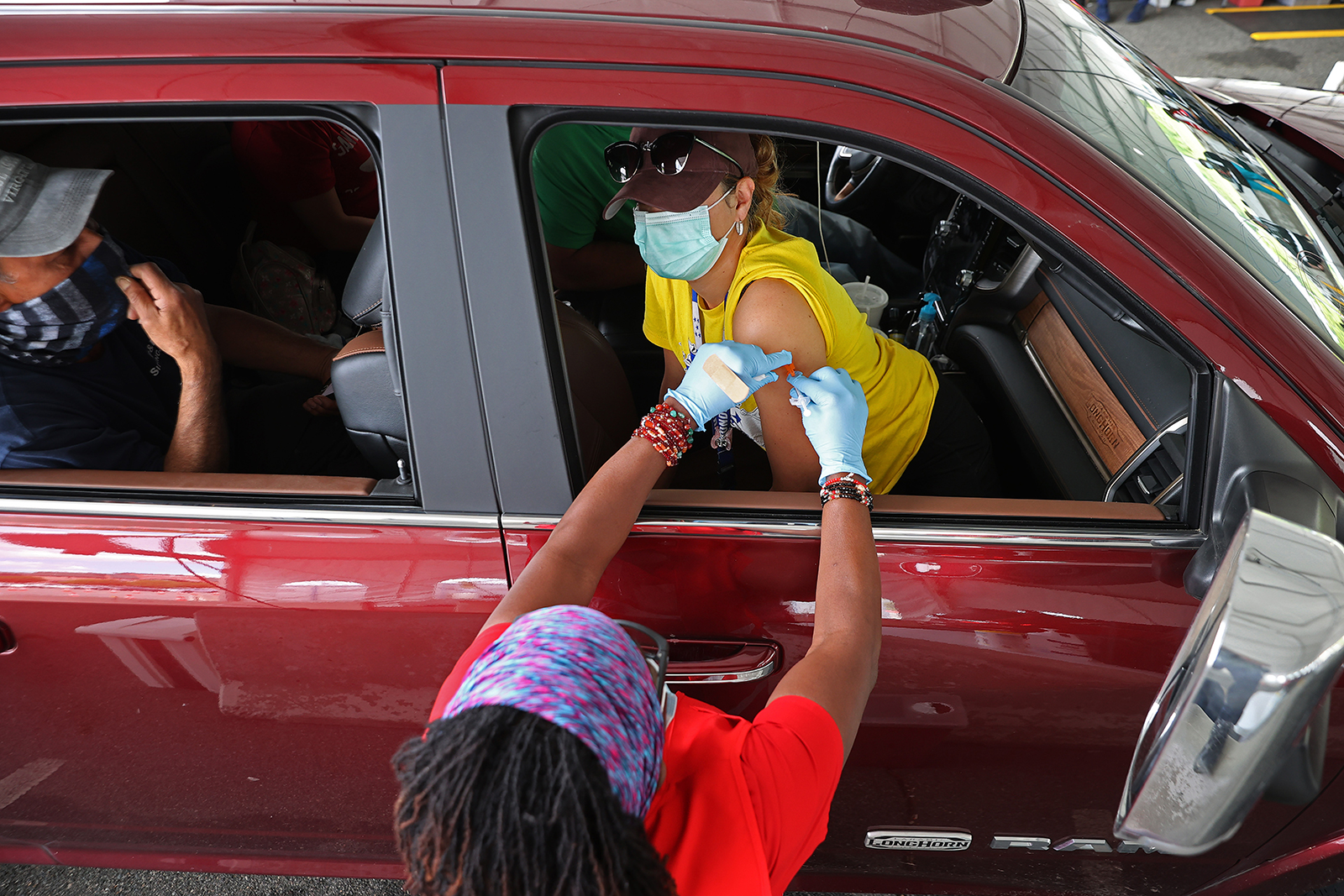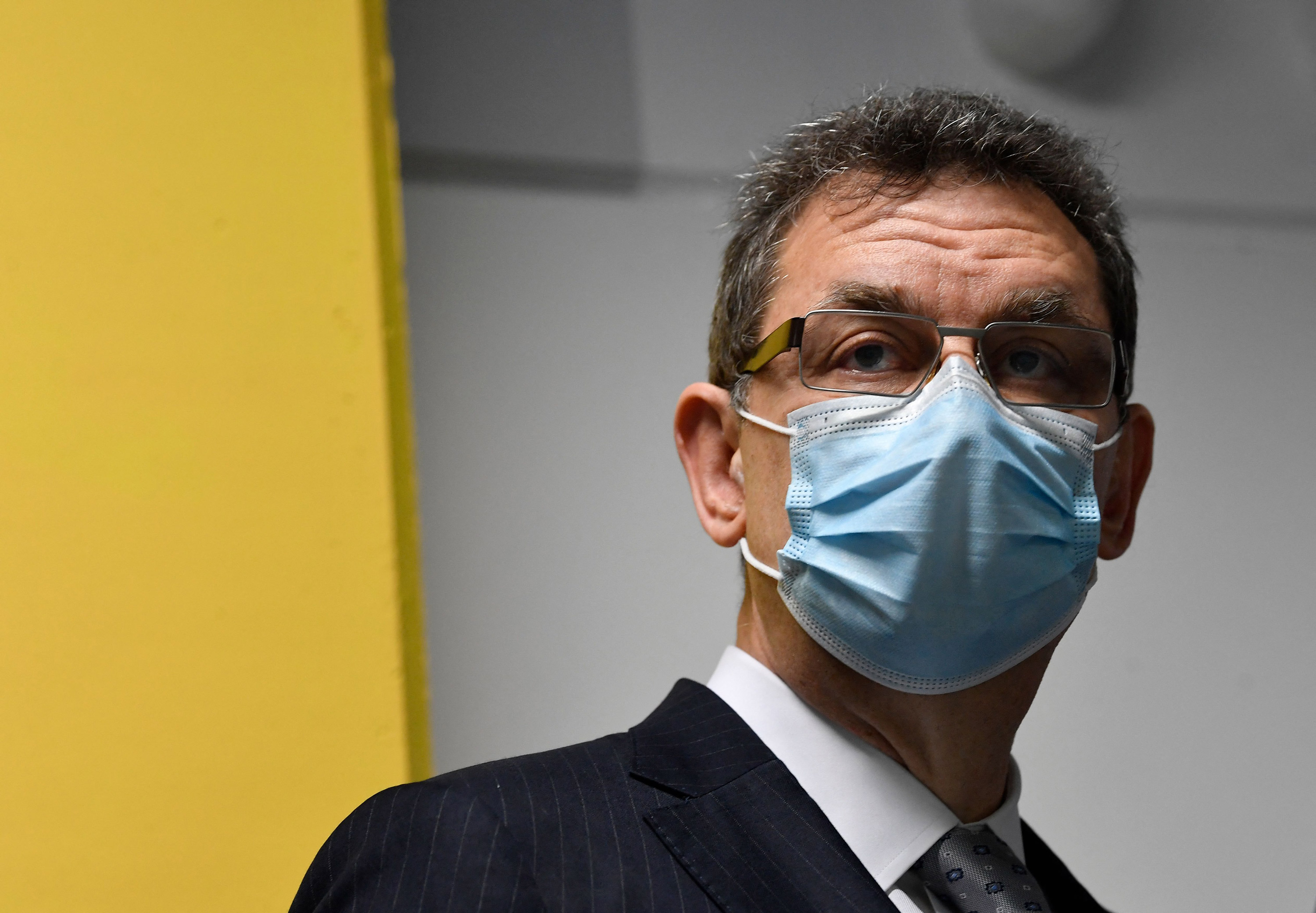
 i_need_contribute
i_need_contribute


|
Country, |
Total |
New |
Total |
|
World |
156,684,013 |
+854,752 |
3,269,390 |
|
33,369,192 |
+47,819 |
594,006 |
|
|
21,485,285 |
+414,433 |
234,071 |
|
|
15,009,023 |
+72,559 |
417,176 |
|
|
5,728,090 |
+21,712 |
105,850 |
|
|
4,977,982 |
+22,388 |
42,187 |
|
|
4,855,128 |
+7,639 |
112,246 |
|
|
4,428,553 |
+2,613 |
127,583 |
|
|
4,082,198 |
+11,807 |
122,263 |
|
|
3,559,222 |
+7,960 |
78,726 |
|
|
3,486,462 |
+17,014 |
84,811 |
|
|
3,095,582 |
+24,086 |
66,263 |
|
|
2,951,101 |
+16,490 |
76,414 |
|
|
2,818,378 |
+6,431 |
68,993 |
|
|
2,610,018 |
+18,409 |
73,906 |
|
|
2,355,985 |
+3,021 |
218,007 |
|
|
2,097,024 |
+6,038 |
45,451 |
|
|
1,832,671 |
+8,214 |
63,223 |
|
|
1,697,305 |
+5,647 |
46,496 |
|
|
1,641,137 |
+1,870 |
29,586 |
|
|
1,590,370 |
+2,149 |
54,620 |
|
|
1,538,589 |
+6,789 |
17,269 |
|
|
1,265,320 |
+7,992 |
24,489 |
|
|
1,229,248 |
+6,299 |
26,895 |
|
|
1,098,187 |
+6,233 |
15,673 |
|
|
1,080,172 |
+6,637 |
17,991 |
|
|
1,062,527 |
+1,632 |
28,710 |
|
|
1,003,746 |
+4,119 |
24,406 |
|
|
845,833 |
+4,197 |
18,537 |
|
|
838,828 |
+61 |
6,374 |
|
|
838,475 |
+373 |
16,988 |
|
|
787,647 |
+1,680 |
28,297 |
|
|
769,160 |
+1,822 |
11,796 |
|
|
717,930 |
+1,007 |
9,014 |
|
|
697,241 |
+1,366 |
6,499 |
|
|
627,484 |
+1,245 |
10,333 |
|
|
616,123 |
+3,763 |
10,517 |
|
|
531,234 |
+1,017 |
7,415 |
|
|
530,944 |
+1,724 |
1,604 |
|
|
513,016 |
+360 |
9,049 |
|
|
427,927 |
+3,551 |
1,610 |
|
|
423,406 |
+1,090 |
7,032 |
|
|
408,372 |
+545 |
16,800 |
|
|
395,327 |
+2,279 |
19,018 |
|
|
384,660 |
+343 |
11,920 |
|
|
368,580 |
+8,970 |
3,529 |
|
|
366,364 |
+389 |
6,255 |
|
|
364,951 |
+1,219 |
2,602 |
|
|
355,445 |
+3,418 |
10,847 |
|
|
341,052 |
+1,640 |
7,355 |
|
|
334,812 |
+2,443 |
3,833 |
|
|
324,685 |
+844 |
4,635 |
|
|
317,719 |
+1,806 |
4,227 |
|
|
317,010 |
+1,410 |
11,208 |
|
|
312,407 |
+1,835 |
13,123 |
|
|
300,387 |
+651 |
3,326 |
|
|
291,540 |
+2,566 |
6,883 |
|
|
281,772 |
+1,236 |
1,621 |
|
|
269,184 |
+623 |
3,514 |
|
|
263,094 |
+2,559 |
3,341 |
|
|
260,802 |
+663 |
3,822 |
|
|
256,482 |
+1,012 |
2,493 |
|
|
254,140 |
+1,342 |
4,004 |
|
|
252,153 |
+333 |
5,912 |
|
|
251,474 |
+387 |
4,921 |
|
|
244,556 |
+835 |
4,282 |
|
|
234,015 |
+1,110 |
13,714 |
|
|
232,439 |
+1,150 |
7,677 |
|
|
218,325 |
+425 |
4,192 |
|
|
216,964 |
+1,131 |
5,439 |
|
|
213,449 |
+3,582 |
2,972 |
|
|
209,470 |
+593 |
493 |
|
|
204,057 |
+1,479 |
2,244 |
|
|
199,344 |
+772 |
2,083 |
|
|
184,697 |
+1,367 |
670 |
|
|
179,193 |
+266 |
3,059 |
|
|
165,301 |
+28 |
2,065 |
|
|
162,098 |
+705 |
2,850 |
|
|
131,510 |
+91 |
2,406 |
|
|
125,519 |
+574 |
1,851 |
|
|
124,147 |
+366 |
1,187 |
|
|
123,473 |
+201 |
3,307 |
|
|
121,509 |
+773 |
2,178 |
|
|
119,424 |
+1,895 |
745 |
|
|
115,411 |
+506 |
767 |
|
|
112,714 |
+1,060 |
701 |
|
|
98,042 |
+112 |
1,526 |
|
|
97,278 |
+320 |
1,640 |
|
|
93,176 |
+452 |
657 |
|
|
91,946 |
+97 |
1,256 |
|
|
90,726 |
+5 |
4,636 |
|
|
88,078 |
+280 |
919 |
|
|
76,811 |
+1,911 |
336 |
|
|
74,946 |
+2,696 |
1,152 |
|
|
70,108 |
+56 |
819 |
|
|
10,816 |
+120 |
213 |
|
|
3,090 |
+68 |
35 |
Retrieved from: https://www.worldometers.info/coronavirus/
From journalist Masrur Jamaluddin in Jakarta

A doctor's hand is seen next to a Covid-19 patient's hand at a general hospital in Bogor, Indonesia, on January 25. Adek Berry/AFP/Getty Images
Covid-19 has killed at least 366 doctors in Indonesia since March 2020, according to the latest data the Indonesian Medical Association's Mitigation Team released on May 3.
Sixty-four doctors in Indonesia died in January after contracting coronavirus, making it the deadliest month for doctors during the pandemic.
Indonesia is the world's fourth most-populous nation and has experienced one of the worst Covid outbreaks in Asia. More than 1.6 million cases and 46,000 deaths have been recorded since the pandemic began, according to Johns Hopkins University.
Earlier this week, Indonesia's Health Ministry confirmed two patients with the Covid variant B.1.617 first identified in India. The country has recorded a daily average of about 5,000 Covid-19 cases in the past week.
Authorities are concerned about the impact of the upcoming Mudik holiday, in which tens of millions of people travel to see their family in their hometowns to celebrate Eid al-Fitr, the end of Ramadan.
To halt the spread of Covid-19 during Eid festivities, the Indonesian government has banned all domestic travel from May 6 to May 17. The ban covers public and private journeys, including cars, motorcycles, buses, trains, ferries, ships and planes.
However, a poll from Indonesia's state-run Antara news agency found that an estimated 18 million people, or 7% of the population, are still planning on traveling for the Eid al-Fitr holiday despite the travel bans.
From CNN Health’s Lauren Mascarenhas

A woman receives her first dose of the Pfizer vaccine at Ripken Baseball in Aberdeen, Maryland, on May 05. Chip Somodevilla/Getty Images
A coronavirus forecast released Thursday by the Institute for Health Metrics and Evaluation at the University of Washington (IHME) projects 185 million Americans will be vaccinated against coronavirus by September, but warns vaccine hesitancy could contribute to a potential winter surge.
The IHME model projects daily deaths from Covid-19 will decline, resulting in 948,859 Americans dead from coronavirus by September. That scenario accounts for continued spread of the B.1.1.7 virus variant, the one first detected in the UK, in the US and a scale up of vaccination efforts over the next 90 days.
The team recently changed its modeling methodology to account for underreporting of Covid-19 deaths, resulting in higher death estimates than previous forecasts.
The IHME team says it expects over 70% of Americans will receive at least one dose of a Covid-19 vaccine by the end of May, and 65% will be fully vaccinated by mid-June. President Joe Biden announced a plan Tuesday to administer at least one dose of Covid-19 vaccine to 70% of the nation’s adult population by July 4.
“After those points, further increases will be limited by demand,” the team said.
There is the potential for a winter surge, the team said. It largely depends on how many more Americans get vaccinated and whether vaccines prove effective against virus variants.
The coronavirus surge in India, linked to the B.1.617 virus variant, has proven that under certain circumstances, virus transmission can “rapidly and explosively” rise, IHME notes.
In a worst-case scenario, in which vaccinated people revert to pre-pandemic levels of mobility, the model estimates 984,950 US Covid-19 deaths by September. If 95% of Americans started wearing masks, the model projects 939,122 deaths by that time.
Deaths likely undercounted: An IHME analysis also found it's likely that the actual death toll from Covid-19 is likely 6.9 million, more than double the 3.2 million deaths that have been officially reported.
The institute said fatalities were likely “significantly underreported in almost every country” due to a combination of factors, including varied testing capacity to confirm Covid-19 cases and deaths and deaths among older individuals that went unrecorded early in the pandemic, particularly among those in long-term care facilities in high-income countries.
Most of the underreporting is “unintentional,” Dr. Christopher Murray, director of IHME, said in a news briefing Thursday.
“Part of it is just lack of testing and part of it is health care systems just under pressure.”
The United States has reported more deaths than any other country, and the updated IHME analysis estimates the actual number of Covid-19 deaths in the US to be more than 905,000 -- about 58% higher than the reported count of about 574,000. The new analysis estimates the Covid-19 death toll in the US to rise to 949,000 by September.
From CNN’s Arnaud Siad

Patients wait at a Covid-19 vaccination center in Sainte-Genevieve-des-Bois, France, on April 24. Raphael Lafargue/Pool/AFP/Getty Images
France will broaden access to its coronavirus vaccine program by allowing "all adults" to book a shot if there are vacant slots available the next day, French President Emmanuel Macron announced in a tweet on Thursday.
Currently, only people aged 55 or older and those with comorbidities are eligible for the Covid-19 vaccine. Starting May 12, all adults – without exception – will be eligible to book a vaccine for any slots that are still free 24 hours before the appointment.
“Not a single slot must be lost. Starting May 12, appointments that are still vacant 24 hours before, will be open to all adults without conditions,” Macron tweeted.
In another tweet on Thursday, Macron added, “Vaccinating during the day. Vaccinating at night. Vaccinating on weekends. Vaccinating on public holidays. Thanks to all those who don’t count the hours worked to save lives. This is what this is all about.”
France is set to open Covid-19 vaccination to all adults over 50 years old on Monday, the next target group in their vaccination campaign.
According to the latest data from French authorities, nearly 17 million people have received a first dose of a Covid-19 vaccine as of Tuesday, with 7.5 million fully vaccinated.
France has authorized four vaccines so far: Pfizer/BioNTech, Moderna, AstraZeneca and Johnson & Johnson
From CNN's Nadia Kounang

Pfizer CEO Albert Bourla visits a Pfizer factory in Puurs, Belgium, on April 23. John Thys/Pool/AFP/Getty Images
Pfizer CEO Albert Bourla says he expects results from tests of booster vaccines and newly formulated vaccines in the coming months.
“We are trying the efficacy of a booster, sort of the same vaccine against the wild type and all the variants, and also the efficacy of a new vaccine which is tailor made for the South African variant,” said Bourla. “And this data will come in one month or two.”
Bourla spoke as part of a panel discussion with CNN’s chief medical correspondent Dr. Sanjay Gupta and former FDA commissioner Dr. Scott Gottlieb. The discussion was pre-recorded on April 30 and was streamed on Thursday as part of the Fifth International Vatican Conference.
Pfizer rival Moderna reported data Wednesday from its trial of booster doses and its reformulated vaccine made to match the B.1.351 variant first seen in South Africa.
The Pfizer CEO says the company can produce a booster or variant-specific vaccine in 90 days. “From the day we make the decision that this is a variant, that we need to do something about it, within 90 something days to be able to have a product ready,” Bourla said.
When asked by Gupta if the boosters or new vaccines will have to be reauthorized, Bourla likened the process to the reauthorization of new flu vaccines every year, which are targeted to different strains circulating each year. The US Food and Drug Administration and other regulators around the world approve the new formulations without requiring a lengthy new clinical trial process.
Gottlieb noted that when assessing flu vaccine effectiveness, instead of doing large trials to determine efficacy, researchers can run lab tests to see if the vaccines elicit an immune response.
“I think what you're going to see emerge is the ability to authorize new vaccines on the basis of immunogenicity data, the ability to demonstrate that you can develop antibodies that bind to the new epitopes or the particular spike protein that's in (B.1. 351) or B.117,” he said, referring to the variants first identified in South Africa (B.1.351) and in the UK (B.1.1.7). Gottlieb added that regulators will ”probably still require some clinical data to look at antibody responses and people but they won't be looking for long term outcomes in those studies.”
The Cura Foundation’s Fifth International Vatican Conference is a partnership among the Vatican’s Pontifical Council for Culture, the Cura Foundation, and the Science and Faith Foundation that brings together leaders of faith and science to discuss issues of health care and medicine.
Retrieved from: https://edition.cnn.com/world/live-news/coronavirus-pandemic-vaccine-updates-05-06-21/index.html
By Sameer Yasir and Suhasini Raj

A vaccination center at a school in New Delhi on Wednesday. Credit...Tauseef Mustafa/Agence France-Presse — Getty Images
As India recorded a single-day high in new coronavirus cases on Thursday, its vaccination campaign has been marred by shortages and states are competing against one another to get doses, limiting the government’s hope that the country can soon emerge from a devastating outbreak.
The Indian health ministry recorded about 410,000 cases in 24 hours, a new global high, and 3,980 deaths, the highest daily death toll in any country outside the United States. Experts believe the number of actual infections and deaths is much higher.
A second wave of infections exploded last month, and some Indian states reintroduced partial lockdowns, but daily vaccination numbers have fallen. The government said it had administered nearly two million vaccine doses on Thursday, far lower than the 3.5 million doses a day it reached in March. Over the past week, 1.6 million people on average were vaccinated daily in the country of 1.4 billion.
India’s pace of vaccinations has become a source of global concern as its outbreak devastates the nation and spreads into neighboring countries, and as a variant first identified there begins to be found around the world. The outbreak has prompted India to keep vaccine doses produced by its large drug manufacturing industry at home instead of exporting them, slowing down vaccination campaigns elsewhere.
In an effort to make doses more widely available within India, the authorities have allowed states and private health care providers to buy vaccines directly from manufacturers. But that has left state governments competing with one another for doses, and experts say it has added more troubles to a sluggish rollout. The authorities in Delhi, the capital, and several states have said they had to delay the expansion of vaccine access to younger age groups because of shortages.
India also lacks enough doses to meet the growing demand. Two domestic drug companies — the Serum Institute of India, which is manufacturing the vaccine developed by AstraZeneca, and Bharat Biotech, which is making its own vaccine — are producing fewer than 100 million doses per month.
About 3 percent of India’s population has been fully vaccinated, and 9.2 percent of people have received at least one dose. Experts say that, at the current rate, the country is unlikely to meet Prime Minister Narendra Modi’s target of inoculating 300 million people by August.
India has recorded 21 million coronavirus cases and more than 230,000 deaths, according to a New York Times database.
India’s government has said it will fast-track approvals of foreign-made vaccines, and on Wednesday the Biden administration said it would support waiving intellectual property protections for Covid-19 vaccines to increase supplies for lower-income countries.
But a waiver would need to win unanimous support at the World Trade Organization — and even then, experts say, India’s drug companies would need extensive technological and other support to produce doses.
“The drop in I.P. protections is only one element,” Anant Bhan, a health researcher at Melaka Manipal Medical College in southern India, said of intellectual property. Because of the additional steps required to begin making a vaccine on a huge scale, he said, “It is not going to mean increased access to vaccines in the near future.”
As Mr. Modi has declined to impose a nationwide lockdown like the one he brought in last year, states have adopted their own measures. On Thursday, the southern state of Kerala, which has one of the highest caseloads, announced a near-total lockdown until May 16.
Experts also worry that a crisis may be unfolding in India’s rural areas, where testing capacities are even more limited.
“My main concern is nonavailability of testing and the logistics of not getting people tested in rural areas,” said Gautam Menon, a professor of physics and biology at Ashoka University in northern India. “So we will never get the real numbers for either infection rates or deaths from many such quarters of India.”
The U.S. State Department has approved the departure of family members of U.S. government employees in India and is urging American citizens to take advantage of commercial flights out of the country. It said on Wednesday that it would approve the voluntary departure of nonemergency U.S. government employees.
On Thursday, Sri Lanka became the latest country to bar travelers from India, joining the United States, Britain, Australia and others.
Retrieved from: https://www.nytimes.com/2021/05/06/world/asia/india-covid-vaccines.html
By Rebecca Griesbach and Libby Seline

Demonstrators protested conditions at San Quentin State Prison in California, where more than 2,600 inmates have tested positive for the coronavirus over the past year.Credit...Jim Wilson/The New York Times
The coronavirus tore through prisons, jails and immigration detention centers in the United States over the past year, killing more than 2,700 incarcerated people. Dozens of them died after being approved for release by a parole board, or while being held before trial.
At least nine prison inmates around the country who were already cleared for release died before their scheduled discharge dates. More than 50 men and women died of Covid-19 in local jails while awaiting resolution of the charges that put them there.
Those findings come from a New York Times review of state and federal court records and data, and interviews with prosecutors, judges, defense lawyers and court administrators.
The deaths raise troubling questions about the way the country’s justice system responded to a pandemic that infected incarcerated people at more than three times the national rate.
“Being in jail or prison, especially for a nonviolent offense, should not be a death sentence,” said Andrew H. Warren, the state attorney for Hillsborough County, Fla.
The World Health Organization on Thursday warned of a new wave of Covid-19 infections in Africa due to delayed vaccine supplies, a slow rollout and new variants, AFP reports.
The African bureau of the UN agency said the continent had to catch up with the rest of the world in terms of vaccine rollouts.
“The delay in the delivery of vaccine doses from the Serum Institute of India earmarked for Africa, the delay in the deployment of vaccines and the emergence of new variants means that the risk of a new wave of infections remains very high in Africa,” it said in a statement.
It added that new variants such as the ones that emerged in India and South Africa could unleash a “third wave” on the continent.
“The tragedy in India does not have to happen here in Africa, but we must all be on the highest possible alert,” said regional WHO director Matshidiso Moeti.
“While we call for vaccine equity, Africa must also knuckle down and make the best of what we have. We must get all the doses we have into people’s arms.”
Some African countries had been exemplary in deploying vaccines, the WHO said, without naming them.
But it added that in spite of this, only just under “half of the 37 million doses received in Africa have been administered so far”.
Africa now accounts for only one percent of vaccine doses administered globally, the WHO said - down from two percent a few weeks ago, as other regions’ rollouts are progressing much faster.
The first vaccines deliveries to 41 African countries under the Covax scheme began in March but nine countries have so far administered only a quarter of the doses received, while 15 countries have used less than half of their allocations.
The vaccination rate in Africa is the world’s lowest. Globally an average of 150 vaccine doses per 1,000 people have been administered, but in sub-Saharan Africa it is hardly eight doses per 1,000, according to the WHO.
Here are the other key developments from the last few hours:
· Denmark has eased more Covid restrictions with a “corona pass.” Gyms, theatres and cinemas opened on Thursday as part of the country’s Covid-19 relaxation programme.
· Support for vaccine patent waivers grows across the globe despite Germany’s opposition.
· England’s chief medical officer Prof Chris Whitty has said that Covid-19 is unlikely ever to be eradicated, and the outlook for the pandemic remains “pretty bleak” in the medium term.
· The World Health Organisation (WHO) warned of a new wave of Covid-19 infections in Africa due to delayed vaccine supplies, a slow rollout and new variants.
· The United States has administered 251,973,752 doses of Covid-19 vaccines in the country and distributed 324,610,185 doses, the U.S. Centers for Disease Control and Prevention (CDC) said on Thursday.
· Brazil registers 73,380 new coronavirus cases, bringing the total number of confirmed cases above the 15 million mark.